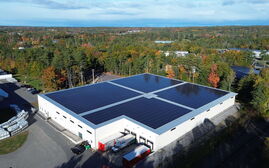USM, aquaculture company get $250K to test a natural pollution solution
The University of Southern Maine and Running Tide, a Portland aquaculture company, have received a $250,000 grant to see if Maine marine species can be used to reduce pollution in Casco Bay.
The award, announced Thursday, was a National Estuary Program Coastal Watershed Grant from Restore America’s Estuaries and the U.S. Environmental Protection Agency.
In the next two years, the New England Environmental Finance Center and Casco Bay Estuary Partnership at USM, in partnership with Running Tide, will test the cost effectiveness of shellfish and kelp to reduce nitrogen levels and blooms of algae in the southern Maine bay.
Compared to other areas on the East Coast, Casco Bay is relatively healthy, but nutrient pollution is a rising problem, leading to harmful algal blooms, ocean acidification, and other ecological effects that distress marine habitats and disrupt the fishing and tourism industries, which are the backbone of our coastal economies," said U.S. Rep. Chellie Pingree, D-Maine 1st District.
Pingree helped secure funding for the Coastal Watershed Grants Program as chair of the House Subcommittee on Interior, Environment, and Related Agencies.
The project team will establish a four-acre aquaculture growing facility in Casco Bay near Portland’s East End. Running Tide will grow kelp and shellfish that will absorb nitrogen from the water as they grow. As the kelp is harvested and shellfish mature over the course of a year, nitrogen is removed from the ecosystem.
Casco Bay communities and the city of Portland have been investing in clean water for years. Recent changes at the East End Wastewater Treatment Facility have reduced summer discharges of nitrogen to Casco Bay by more than two-thirds, but future investments are likely to be costly. The Portland Water District estimated that upgrading the East End Plant to full removal of nutrients would cost about $40 million.
“On a pound for pound basis, is it less expensive to manage nutrients in Casco Bay by upgrading wastewater treatment plants, by building green infrastructure, or by investing in seaweed aquaculture?” asks Curtis Bohlen, director of the Casco Bay Estuary Partnership.
This project aims to help answer some of these questions.
Maine currently has no numerical nitrogen targets for coastal waters, but conversations are underway to establish water quality criteria in Portland waters that could lead to limits on total discharges of nutrients allowed. In the long run, the team envisions the possibility of a nutrient trading scheme for Casco Bay.
“The advantage of a nutrient trading scheme is that dischargers facing high costs for nitrogen control could invest in less expensive approaches — potentially by growing shellfish or kelp” said Martha Sheils, the director of the New England Environmental Finance Center. “Knowing the cost-effectiveness of nitrogen reduction from aquaculture will give Portland a new innovative method to improve the Bay’s water quality.”
Pingree added, “With funding from this grant program, local organizations in Maine and across the country will have the tools they need to ensure clean water and healthy ecosystems and fight against climate change."













0 Comments